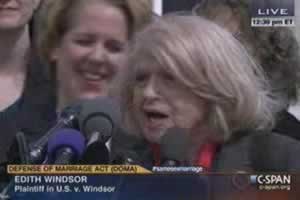Supreme Court likely to strike down gay marriage ban DOMA
Thu. March 28, 2013 7:06 AM by GoPride.com News Staff
Washington, DC -
The Supreme Court on Wednesday signaled that it would likely strike down the Defense of Marriage Act (DOMA), the 1996 law which prevents federal agencies from recognizing the legal marriages of gay and lesbian couples.
After oral arguments in the case challenging the constitutionality of the law, NBC News correspondent Pete Williams reported that there seemed to be five justices leaning against the law.
Influential court watcher SCOTUSblog tweeted: "#scotus 80% likely to strike down #doma. J Kennedy suggests it violates state's' rights; 4 other Justices see as gay rights."
"It's very troubling," said Justice Anthony Kennedy, considered a swing vote.
"The question is whether the federal government ... has the authority to regulate marriage," Kennedy said during the nearly 2-hour hearing. "That authority undermines the states' role in the federal system."
Justice Ruth Bader Ginsburg said DOMA creates two kinds of marriage: "Full marriage" and "skim milk marriage."
In United States v. Windsor, Edith Windsor sued the federal government after she received an estate bill of more than $360,000 resulting from the death of her wife Thea Spyer. The women shared their lives for 44 years and married in Toronto, Canada in 2007. In 2009, New York began recognizing the marriages of gay couples, although gay couples could not enter such unions in the Empire State until 2011. Spyer died in 2009.
Appearing outside of the court, Windsor thanked her supporters and became emotional when asked about a broach she was wearing, which was given to her by her late wife.
After the Department of Justice announced it would no longer defend the law in court, House Speaker John Boehner, a Republican from Ohio, directed the so-called Bipartisan Legal Advisory Group (BLAG) to step in. BLAG hired former Solicitor General Paul Clement to argue more than a dozen cases challenging the constitutionality of DOMA.
Clement argued before the justices that the law made only a "narrow" technical point, defining marriage for the purposes of the federal government.
Justice Elena Kagan quoted from a House report which accompanied passage of the law that stated that Congress was approving the law to express "moral disapproval of homosexuality."
"If that's enough to invalidate the statute, you should invalidate the statute," Clement said.
Related: Audio and transcript of the Supreme Court oral arguments on DOMA
After oral arguments in the case challenging the constitutionality of the law, NBC News correspondent Pete Williams reported that there seemed to be five justices leaning against the law.
Influential court watcher SCOTUSblog tweeted: "#scotus 80% likely to strike down #doma. J Kennedy suggests it violates state's' rights; 4 other Justices see as gay rights."
"It's very troubling," said Justice Anthony Kennedy, considered a swing vote.
"The question is whether the federal government ... has the authority to regulate marriage," Kennedy said during the nearly 2-hour hearing. "That authority undermines the states' role in the federal system."
Justice Ruth Bader Ginsburg said DOMA creates two kinds of marriage: "Full marriage" and "skim milk marriage."
In United States v. Windsor, Edith Windsor sued the federal government after she received an estate bill of more than $360,000 resulting from the death of her wife Thea Spyer. The women shared their lives for 44 years and married in Toronto, Canada in 2007. In 2009, New York began recognizing the marriages of gay couples, although gay couples could not enter such unions in the Empire State until 2011. Spyer died in 2009.
Appearing outside of the court, Windsor thanked her supporters and became emotional when asked about a broach she was wearing, which was given to her by her late wife.
After the Department of Justice announced it would no longer defend the law in court, House Speaker John Boehner, a Republican from Ohio, directed the so-called Bipartisan Legal Advisory Group (BLAG) to step in. BLAG hired former Solicitor General Paul Clement to argue more than a dozen cases challenging the constitutionality of DOMA.
Clement argued before the justices that the law made only a "narrow" technical point, defining marriage for the purposes of the federal government.
Justice Elena Kagan quoted from a House report which accompanied passage of the law that stated that Congress was approving the law to express "moral disapproval of homosexuality."
"If that's enough to invalidate the statute, you should invalidate the statute," Clement said.
Related: Audio and transcript of the Supreme Court oral arguments on DOMA






